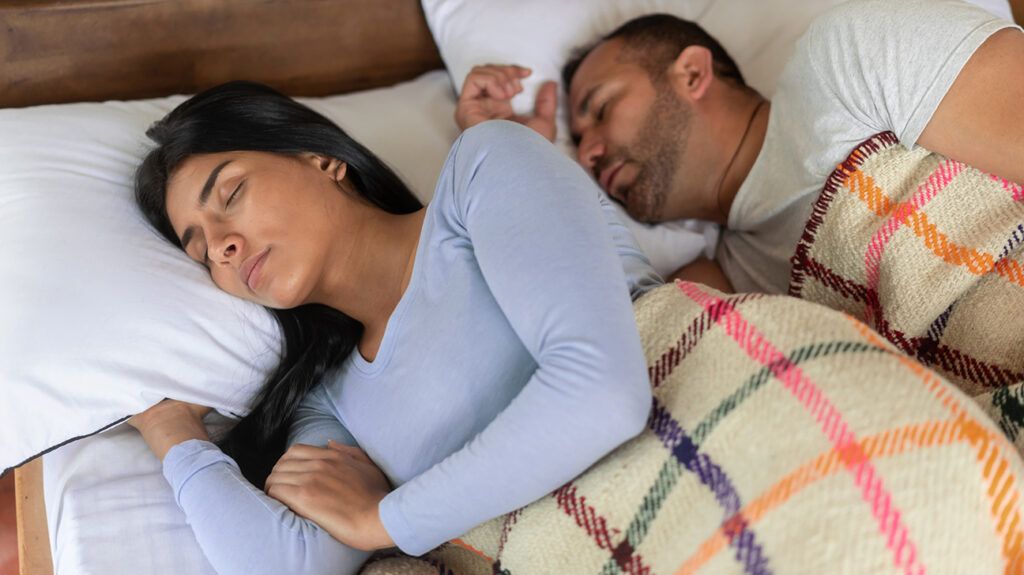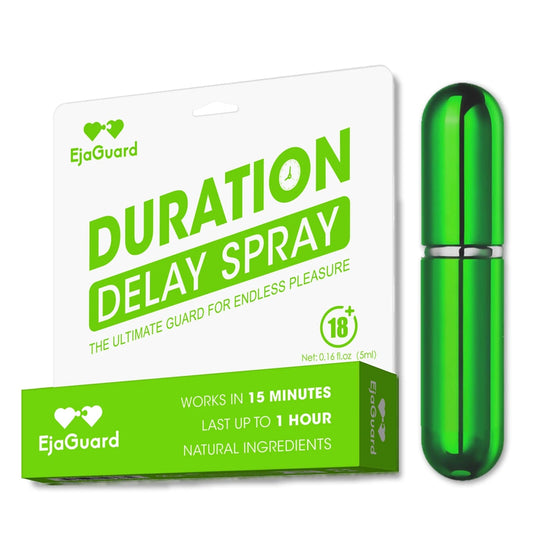الأرق الجنسي أثناء النوم: ما هو، ولماذا يحدث، وكيف يؤثر على حياتك الجنسية
ما هو الجنس أثناء النوم؟
الجنس أثناء النوم، والمعروف أيضًا باسم الجنس أثناء النوم ، هو نوع من اضطرابات النوم. يدفع الشخص إلى ممارسة سلوكيات جنسية أثناء نومه دون وعي.
من اللمس أو التأوه إلى الجماع الكامل، قد تختلف شدة الأرق الجنسي، وقد يفقد الشخص ذاكرة ما حدث. إنه أمر نادر، ولكنه حقيقي جدًا.
إذا نشأت مشاكل في العلاقة الحميمة بسبب اضطراب النوم أو القلق، جرب بخاخ EjaGuard Delay Spray للمساعدة في بناء الثقة وتوسيع نطاق المتعة عند الاستيقاظ.
هل النعاس الجنسي حقيقي؟ فهم العلم
نعم، الأرق الجنسي أثناء النوم حالة مُعترف بها طبيًا. وهو جزء من مجموعة أوسع من اضطرابات النوم تُسمى اضطرابات النوم غير المرتبطة بحركة العين السريعة ، والتي تشمل أيضًا المشي أثناء النوم والكوابيس الليلية.
خلال هذه النوبات، يبقى الدماغ عالقًا بين مراحل النوم. يُمارس الجسم سلوكيات - كالجنس مثلاً - حتى وإن لم يكن العقل واعيًا تمامًا.
أظهرت الدراسات أن المصابين باضطراب النوم الجنسي لا يدركون أفعالهم خلال هذه النوبات. وهذا ما يجعله مختلفًا عن مجرد "نصف نائم" أو "في مزاج جيد أثناء النعاس".
علامات وأعراض النعاس الجنسي أثناء النوم

فيما يلي العلامات الأكثر شيوعًا لاضطراب النوم الجنسي:
-
الاستمناء أثناء النوم
-
التأوه الجنسي أو الحديث البذيء
-
بدء الجماع أثناء النوم
-
التحسس أو لمس الشريك
-
المشي أثناء النوم مقترنًا بالأفعال الجنسية
-
لا يوجد ذاكرة للحدث بعد ذلك
قد يستيقظ بعض الأشخاص أثناء العلاقة الحميمة، بينما يظل آخرون نائمين طوال الوقت. غالبًا ما يلاحظ الشركاء الأعراض قبل أن يلاحظها الشخص المصاب بالأرق الجنسي أثناء النوم.
إذا كنت تستكشف المتعة الفردية بسبب مخاوف تتعلق بالشريك، فإن أجهزة الاستمناء من EjaGuard وديلدو تقديم خيارات سرية ومرضية.
ما الذي يسبب اضطراب النوم الجنسي؟

ليس للأرق الجنسي سبب واضح دائمًا. ومع ذلك، رُبطت به عدة عوامل:
-
التوتر والقلق
-
الحرمان من النوم
-
تعاطي الكحول أو المخدرات
-
اضطرابات النوم الموجودة مثل انقطاع النفس أو الأرق
-
أنماط النوم غير المنتظمة
-
تاريخ اضطرابات النوم
الرجال أكثر عرضة للإصابة بهذا المرض، ولكنه قد يصيب أي شخص. قد تلعب الوراثة دورًا أيضًا - فإذا كانت اضطرابات النوم شائعة في عائلتك، فقد تكون أكثر عرضة للخطر.
فكر في دمج منتجات اليقظة الذهنية أو منتجات العلاقة الحميمة التي تقلل التوتر للمساعدة في تقليل القلق قبل النوم.
كيف يؤثر إدمان الجنس أثناء النوم على علاقاتك وحياتك الجنسية

قد يكون العيش مع الأرق الجنسي أثناء النوم أمرًا مُربكًا ومُخيفًا، خاصةً للأزواج. إليك كيف يُمكن أن يؤثر ذلك على حياتك الجنسية وعلاقتك العاطفية:
-
مشاكل الثقة - قد يشعر أحد الشريكين بعدم الارتياح أو الانتهاك
-
الشعور بالذنب والعار - قد يشعر الشخص المصاب باضطراب النوم الجنسي بالحرج
-
سوء التواصل – يتجنب العديد من الأزواج الحديث عن الأمر، مما يجعل الأمر أسوأ
-
زيادة القلق - الخوف من حدوث ذلك مرة أخرى قد يقلل من الرغبة في ممارسة الجنس
يمكن أن يساعد التواصل المفتوح والعلاج والتفاهم في تخفيف التوتر وإعادة بناء العلاقة الحميمة.
أشعل شغفك بأمان مع زيوت التشحيم من EjaGuard والملابس الداخلية ، مثالية لإعادة بناء الاتصال الجسدي بطريقة توافقية.
التشخيص: كيف يتم التعرف على اضطراب النوم الجنسي؟

إذا كنت تشك في وجود مشكلة الأرق أثناء النوم، فابدأ بزيارة أخصائي نوم . من المرجح أن يقوم بما يلي:
-
قم بمراجعة تاريخك الطبي وتاريخ نومك
-
اطلب من شريكك الملاحظات
-
اقترح إجراء تخطيط النوم (دراسة النوم طوال الليل)
في بعض الحالات، قد تحتاج إلى تسجيل ليالٍ متعددة من النوم لاكتشاف نوبة. غالبًا ما يُنصح بمراقبة الفيديو لتأكيد السلوك.
هام: لا ينبغي تشخيص الأرق الجنسي ذاتيًا. التشخيص الطبي ضروري للعناية المناسبة.
خيارات العلاج لاضطرابات النوم الجنسي

لا يوجد علاج واحد يناسب الجميع لاضطراب النوم الجنسي، ولكن هذه العلاجات أظهرت نجاحًا:
1. تحسين نظافة النوم
-
الالتزام بجدول النوم
-
تجنب الكافيين أو الشاشات قبل النوم
-
النوم في بيئة هادئة ومظلمة
2. إدارة المحفزات
-
التقليل من الكحول
-
عالج التوتر باليقظة أو العلاج
-
علاج انقطاع التنفس أثناء النوم أو الحالات الأخرى
3. الدواء (إذا لزم الأمر)
-
في بعض الحالات، قد يصف الأطباء البنزوديازيبينات أو مضادات الاختلاج لتقليل النوبات
4. العلاج السلوكي
-
يمكن أن يساعد العلاج السلوكي المعرفي (CBT) في التعامل مع المحفزات العاطفية وتقليل القلق
العيش مع اضطراب النوم الجنسي: نصائح للشركاء
قد يكون من الصعب معرفة ما يجب فعله إذا كان شريكك يعاني من الأرق الجنسي أثناء النوم. إليك بعض الخطوات الداعمة:
-
تحدث عن ذلك خلال اليوم ، وليس بعد حدوثه
-
إنشاء حدود - مثل النوم بشكل منفصل إذا لزم الأمر
-
تشجيع الدعم الطبي
-
تجنب اللوم أو العار
-
انضم إلى مجموعات الدعم لاضطرابات النوم
على الرغم من أن الأرق الجنسي أثناء النوم قد يكون مؤلمًا، تذكر: إنه حالة، وليس خيارًا.
النعاس الجنسي مقابل المشي أثناء النوم: ما الفرق؟
على الرغم من أن كلاهما عبارة عن اضطراب النوم، إلا أنهما يختلفان فيما يلي:
| ميزة | الجنس أثناء النوم | المشي أثناء النوم |
|---|---|---|
| نوع السلوك | الأفعال الجنسية أثناء النوم | المشي أو التجول |
| مشغل | الإثارة الجنسية أثناء النوم | تعطيل الضوء أو الصوت |
| الذاكرة بعد | عادة لا يوجد | جزئي أو لا شيء |
| التأثير العاطفي | غالبًا ما تكون أعلى بسبب العلاقة الحميمة | محايد عادة |
قد يحدث اضطراب النوم الجنسي مع المشي أثناء النوم، ولكنه اضطراب منفصل.
الأسئلة الشائعة حول Sexsomnia
هل يمكن لشخص أن يوافق على ممارسة الجنس أثناء نوبة الأرق الجنسي؟
لا، بما أن الشخص ليس واعيًا تمامًا، فهو لا يستطيع من الناحية القانونية والأخلاقية إعطاء الموافقة.
هل يعتبر الإدمان الجنسي أثناء النوم علامة على الإدمان الجنسي؟
لا، إنه مرتبط باضطراب النوم، وليس بالرغبة الجنسية المفرطة أو الإدمان.
هل يختفي الأرق الجنسي من تلقاء نفسه؟
أحيانًا، خاصةً إذا كان سببها التوتر أو قلة النوم. لكن الحالات المستمرة قد تتطلب علاجًا طبيًا.
هل الجنس أثناء النوم خطير؟
قد يكون الأمر كذلك، خاصةً إذا تسبب في أذى نفسي أو حدث مع أطفال في المنزل. اطلب المساعدة مبكرًا.
هل يمكن علاج الإدمان على الجنس أثناء النوم؟
لا يوجد علاج مضمون، ولكن العديد من الأشخاص يرون تحسنًا كبيرًا مع العلاج المناسب وتغيير نمط الحياة.
الخاتمة: فهم اضطراب النوم الجنسي والمضي قدمًا
قد يكون الأرق الجنسي نادرًا، لكنه حقيقي جدًا ويمكن أن يؤثر بشدة على صحتك العاطفية والجنسية.
سواء كنت تعاني من هذه النوبات أو تدعم شريكك الذي يعاني منها، اعلم أنك لست وحدك. مع عادات نوم أفضل، وتواصل واضح، ومساعدة متخصصة، من الممكن تقليل النوبات واستعادة حياة جنسية آمنة ومرضية.
تحكم في صحتك الجنسية - ابتداءً من الليلة.
اكتشف بخاخات تأخير القذف من EjaGuard والحلول الطبيعية لتعزيز العلاقة الحميمة والثقة والتحكم في غرفة النوم.
 Buy Now
Buy Now




